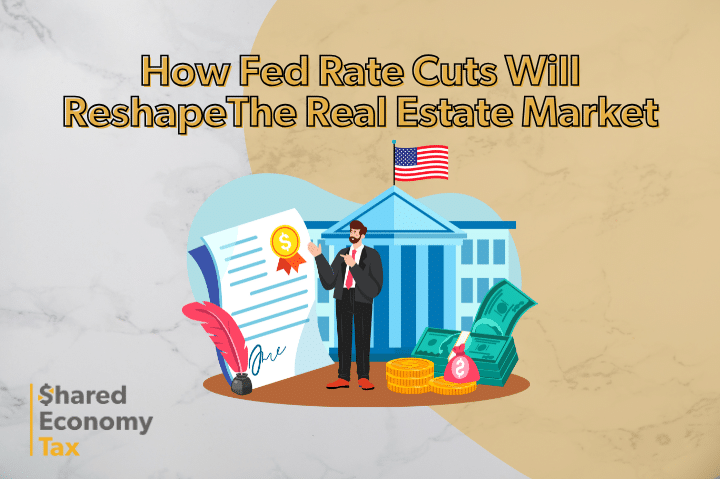
As we approach the final months of 2024, the Federal Reserve’s interest rate policies continue to impact the economy in profound ways, especially the real estate market. Policymakers are hoping to strike a delicate balance between inflation suppression and economic stability. In this article, I’ll explore how the Federal Reserve’s interest rates moves could shape the real estate market, including the effects on property prices, mortgages, and investment opportunities.
The Federal Reserve’s Recent Interest Rate Decisions
In 2024, the Federal Reserve maintained higher interest rates to ensure inflation does not rebound. The inflation rate has softened in recent months, but it still sits above the Federal Reserve’s 2.0% target. As a result, interest rates have hovered around the 5.25% to 5.50% range for much of the year.
Powell has emphasized that while the Federal Reserve may consider future rate cuts, it is in no rush to make significant moves until there is stronger evidence that inflation will continue to decrease. This slow, deliberate approach affects multiple sectors of the economy, particularly real estate, where higher borrowing costs are creating challenges.

How Interest Rate Decisions Affect the Real Estate Market
The Federal Reserve’s interest rate decisions have a direct impact on mortgage rates, which in turn affect the real estate market. When interest rates rise, borrowing costs increase, making mortgages more expensive for potential homebuyers. This reduces demand for housing, leading to slower home sales and, in some markets, a decline in home prices.
In 2024, we’ve seen mortgage rates climb to over 6.5% for 30-year fixed-rate mortgages, making home ownership less affordable for many buyers. As a result, fewer people are able to enter the market, which has slowed housing transactions and, in some areas, caused price stagnation or reductions.
Check out Freddie Mac’s latest mortgage rate report here.
On the flip side, existing homeowners with fixed-rate mortgages have largely been protected from these rising rates, but those looking to sell may face reduced demand, especially in markets with higher home prices. Investors in the real estate market are also feeling the pinch. Higher interest rates increase the cost of financing for property purchases, reducing the potential return on investment, particularly for those looking to flip homes or invest in rental properties.
The Inflation-Real Estate Connection
While inflation has eased, the real estate market continues to face pressures from elevated prices in many areas. The cost of materials, labor, and property management services remains high, making both construction and renovations more expensive.
Additionally, inflation affects the rental market. As general costs of living increase, so do rental prices in many areas, but renters’ wages often fail to keep pace. This dynamic creates tension for property owners, who may struggle to maintain high occupancy rates or face resistance to rent increases.
The Federal Reserve’s ongoing fight against inflation has brought some relief, but the real estate market continues to face challenges. For landlords and investors, understanding inflation trends and how they affect both property values and rental income is critical for success.

Impact on Property Investments
Investors are particularly vulnerable to the Federal Reserve’s interest rate policies. Higher borrowing costs make it more expensive to finance property purchases, reducing the margins for real estate investments. For those looking to grow their real estate portfolios in 2024, the high cost of financing is a major hurdle.
Furthermore, property investors typically rely on favorable market conditions to generate a return on investment, whether through rental income or property value appreciation. With mortgage rates remaining high and the overall economy showing slower growth, real estate investors may see reduced returns in the short term.
Despite these challenges, there are still opportunities in the real estate market, particularly for investors who can manage cash purchases or those who focus on long-term investments in markets with strong economic fundamentals. Locations with high rental demand, such as tourist hotspots or areas with job growth, continue to present viable investment options.
What to Expect for the Rest of 2024
Looking ahead, the Federal Reserve’s interest rate policies are likely to remain a key factor in determining the trajectory of the real estate market. While some analysts expect the Federal Reserve to begin cutting rates later in the year, this is not guaranteed. Powell and the Federal Reserve have indicated that they will not reduce rates until they are confident that inflation is fully under control.
For real estate investors, this means continuing to navigate a landscape of high borrowing costs and cautious market growth. However, if the Federal Reserve does begin to cut rates, we could see renewed activity in the housing market, with more buyers re-entering the market and increased demand for investment properties.
Closing Thoughts on The Real Estate Market in 2024
The Federal Reserve’s interest rate decisions have had a significant impact on the real estate market in 2024. High mortgage rates and inflationary pressures have slowed market activity and made property investment more challenging. However, for savvy investors who can identify opportunities in high-demand areas or who are prepared for long-term investments, there are still opportunities to succeed in the current market.
As we move through the remainder of 2024, it will be important for real estate investors and homeowners alike to stay informed about Federal Reserve policies and the broader economic environment. Keeping a close eye on interest rates, inflation, and market trends will be critical for making sound real estate decisions in the months ahead.
If you are considering a real estate investment or need assistance navigating the complex tax implications of your property holdings, our team of experts at Shared Economy Tax can help. Get started now with a one-on-one strategy session to see how our real estate tax specialists can help slash your tax bill.
Join our newsletter for more tax tips!